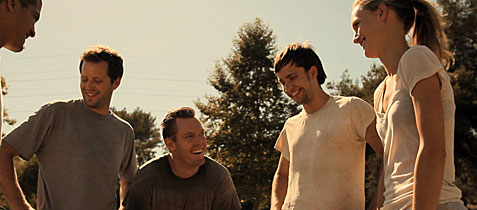Making an irreverent superhero movie in a post “Kick-Ass” world is a risky undertaking, although not a completely futile one. While Matthew Vaughn set the bar pretty high, and the comparisons are inevitable for any film that follows in its footsteps, it’s not the definitive superhero comedy by any stretch. Unfortunately, James Gunn’s “Super” squanders the chance to one-up “Kick-Ass” by wasting so much energy overcoming its own self-inflicted problems to ever be better than mediocre. There’s a lot of wasted potential on display, but thanks to a hilariously unhinged performance from Ellen Page, “Super” manages to rise above its drastically uneven tone to deliver an amusing, if admittedly flawed, superhero black comedy.
Rainn Wilson stars as Frank D’Arbo, a pathetic sad-sack who confesses in the opening minutes of the film that he’s only had two good things ever happen in his life: marrying recovering drug addict Sarah (Liv Tyler) and assisting the police in the arrest of a bank robber. So when his wife leaves him for a sleazy drug dealer named Jacques (Kevin Bacon), Frank becomes an emotional wreck and turns to God for advice on what to do next. After he has a religious epiphany about devoting his life to fighting evil, Frank starts cleaning up the streets as the vigilante alter ego, Crimson Bolt, armed only with a wrench. But when Jacques uncovers his secret identity and puts a bounty on his head, Frank must team up with a quirky comic book store clerk named Libby (Page) to take the fight to the bad guys and rescue Sarah.

Fans of Gunn’s previous work will be ecstatic to see so many familiar faces populating the film, including Michael Rooker as Jacques’ right-hand man, Gregg Henry as a police detective hot on the Crimson Bolt’s trail, and even Gunn himself. But the best cameo has to be Nathan Fillion, who appears as a religious superhero TV character called the Holy Avenger in an obscure but comical reference to “Bible Man.” Fillion doesn’t have a whole lot to do, but his character nonetheless plays a pivotal role in the influence that faith has on Frank’s decision to fight crime. Kevin Bacon also has lots of fun hamming it up as the slimy drug dealer, and Rainn Wilson shows genuine flashes of emotion in the lead role, but “Super” simply wouldn’t be as much fun without Ellen Page’s off-the-wall performance – especially when she’s running around the city as the Crimson Bolt’s sidekick, Boltie, who finds a slightly disturbing joy in all the violence.
But while “Super” makes the most of its edgy premise at times, it suffers from an inconsistent tone that bounces between a serious drama, a dark comedy, and a goofy B-movie in the spirit of Gunn’s Troma films. He doesn’t seem to know what kind of film he wants to make, so he’s just thrown elements of all three into the pot and stirred with reckless abandon. It’s also sluggishly paced and poorly written in some areas, with Gunn’s script reading more like the fantasies of a horny teenage comic book geek than the guy behind “Slither” and “Dawn of the Dead.” Still, even with all of its flaws (of which there are plenty), “Super” has enough going for it that fans of the genre will eat it up.






